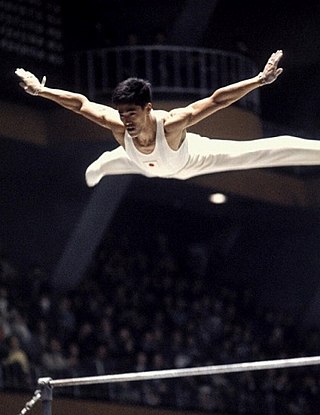
The men's parallel bars was a gymnastics event contested as part of the Gymnastics at the 1964 Summer Olympics programme at the Tokyo Metropolitan Gymnasium. The event was held on 18, 20, and 23 October. There were 128 competitors from 29 nations, with nations in the team competition having up to 6 gymnasts and other nations entering up to 3 gymnasts. The event was won by Yukio Endo of Japan, the nation's first victory in the parallel bars after two Games with silver and bronze medals. It was the first of a four-Games gold medal streak for Japanese gymnasts in the event. Japan also took silver, with Shuji Tsurumi finishing second. Bronze went to Franco Menichelli of Italy.

The men's horizontal bar was a gymnastics event contested as part of the Gymnastics at the 1964 Summer Olympics programme at the Tokyo Metropolitan Gymnasium. The event was held on 18, 20, and 23 October. There were 128 competitors from 29 nations, with nations in the team competition having up to 6 gymnasts and other nations entering up to 3 gymnasts. The event was won by Boris Shakhlin of the Soviet Union, the nation's first victory in the horizontal bar after two Games with silver and bronze medals. The Soviets also took silver, with Yuri Titov finishing second. Shakhlin and Titov were the fifth and sixth men to win multiple medals in the horizontal bar. Bronze went to Miroslav Cerar of Yugoslavia.
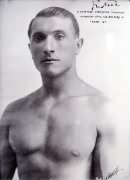
The men's artistic individual all-around event was part of the gymnastics programme at the 1932 Summer Olympics. It was the eighth appearance of the event, which was established in 1900. The competition was held from Monday, August 8, 1932, to Wednesday, August 10, 1932. Twenty-four gymnasts from five nations competed. Each nation could enter a team of 5 gymnasts; Hungary sent only 4. The event was won by Romeo Neri of Italy, the nation's first victory in the event since 1920 and fourth overall. István Pelle of Hungary took silver and Heikki Savolainen of Finland earned bronze; it was the first medal in the event for each nation.
The men's parallel bars competition was one of eight events for male competitors in artistic gymnastics at the 1992 Summer Olympics in Barcelona. The qualification and final rounds took place July 27, 29 and August 2 at the Palau dels Esports de Barcelona. There were 93 competitors from 25 nations, with nations in the team event having 6 gymnasts while other nations could have up to 3 gymnasts. The event was won by Vitaly Scherbo of the Unified Team, the third time in four Games that a Soviet or former Soviet gymnast won the rings. Li Jing of China earned silver. There was a three-way tie for third, with Igor Korobchinski of the Unified Team, Guo Linyao of China, and Masayuki Matsunaga of Japan each receiving bronze medals. They were the first medals for China in the parallel bars.

The men's parallel bars competition was one of eight events for male competitors in artistic gymnastics at the 1988 Summer Olympics in Seoul. The qualification and final rounds took place on September 18, 20 and 24th at the Olympic Gymnastics Hall. There were 89 competitors from 23 nations, with nations competing in the team event having 6 gymnasts and other nations having up to 3 gymnasts. The event was won by Vladimir Artemov of the Soviet Union, bracketing the 1984 boycott with gold medal wins for the Soviets; Valeri Liukin took silver, as well. Sven Tippelt of East Germany took bronze.

The men's horizontal bar competition was one of eight events for male competitors in artistic gymnastics at the 1960 Summer Olympics in Rome. It was held on 5, 7, and 10 September at the Baths of Caracalla. There were 130 competitors from 28 nations, with nations in the team competition having up to 6 gymnasts and other nations entering up to 2 gymnasts. The event was won by Takashi Ono of Japan, the nation's second consecutive victory in the men's parallel bars. Masao Takemoto gave Japan a second medal with his silver. Ono and Takemoto were the third and fourth men to win multiple medals in the parallel bars; Ono was the first to win two gold medals in the event. Boris Shakhlin of the Soviet Union took bronze.

The men's parallel bars competition was one of eight events for male competitors in artistic gymnastics at the 1960 Summer Olympics in Rome. It was held on 5, 7, and 10 September at the Baths of Caracalla. There were 129 competitors from 28 nations, with nations in the team competition having up to 6 gymnasts and other nations entering up to 2 gymnasts. The event was won by Boris Shakhlin of the Soviet Union, the nation's second consecutive victory in the men's parallel bars. Giovanni Carminucci earned Italy's first medal in the event since 1932 with his silver. Takashi Ono of Japan took bronze for a second consecutive Games, making him the fourth man to win multiple medals in the event.

The men's parallel bars competition was one of eight events for male competitors in artistic gymnastics at the 1956 Summer Olympics in Melbourne. It was held from 3 to 7 December at the Melbourne Festival Hall. There were 63 competitors from 18 nations, with nations in the team competition having up to 6 gymnasts and other nations entering up to 3 gymnasts. The event was won by Viktor Chukarin of the Soviet Union, the nation's first victory in the parallel bars. Japan took three medals: a silver by Masumi Kubota and bronzes by Takashi Ono and Masao Takemoto. It was the third time a nation had won three medals in the event in the same Games: the United States had swept the medals in 1904 and Switzerland had earned a gold and two bronzes in 1948. Chukarin was the third man to win multiple medals in the parallel bars; Ono would become the fourth in 1960.
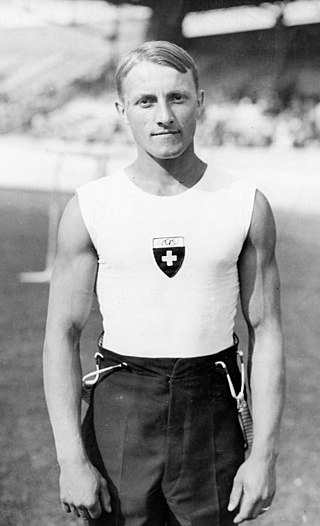
The men's artistic individual all-around event was part of the gymnastics programme at the 1928 Summer Olympics. It was one of seven gymnastics events for men and was the seventh Olympic men's all-around gymnastic championship. Scores from the individual apparatus events were added to give aggregate scores for the individual all-around; individual all-around scores were similarly summed for the team all-around event. There were 88 competitors from 11 nations. Each nation sent a team of 8 gymnasts. The event was won by Georges Miez of Switzerland, with his countryman Hermann Hänggi taking silver. They were the first medals in the event for Swiss gymnasts since 1904 and the first gold medal ever for a Swiss man in the individual all-around. Defending Olympic champion Leon Štukelj of Yugoslavia finished with the bronze this time, making him the third man to win multiple medals in the event.

The men's parallel bars competition at the 1936 Summer Olympics was held at the Waldbühne on 10 and 11 August. It was the sixth appearance of the event. There were 110 competitors from 14 nations, with each nation sending a team of up to 8 men. The event was won by Konrad Frey of Germany, the nation's first victory in the event since 1896. Germany also took the bronze, as Alfred Schwarzmann finished third. Second place and the silver medal went to Michael Reusch of Switzerland. Germany was the first nation to have two gymnasts win the parallel bars.
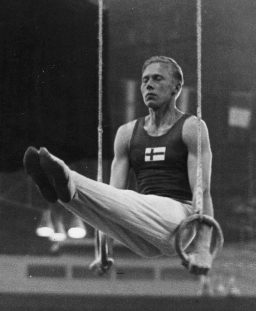
The men's artistic individual all-around competition at the 1948 Summer Olympics was held at Earls Court Exhibition Centre on 12 and 13 August. It was the tenth appearance of the event. There were 123 competitors from 16 nations, with each nation sending a team of up to 8 gymnasts. The event was won by Veikko Huhtanen of Finland, the nation's first victory in the men's all-around. Finland also earned bronze, with Paavo Aaltonen finishing third. For the second consecutive Games, Switzerland took silver—this time with Walter Lehmann as the nation's medalist.
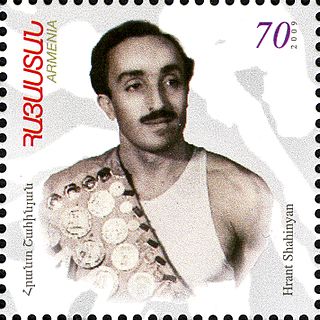
The men's artistic individual all-around competition at the 1952 Summer Olympics was held at Messuhalli, Exhibition Hall I from 19 to 21 July. It was the eleventh appearance of the event. There were 185 competitors from 29 nations. Each nation entered a team of between five and eight gymnasts or up to three individual gymnasts. The event was won by Viktor Chukarin of the Soviet Union, with his countryman Hrant Shahinyan taking silver. It was the Soviet debut in the event, beginning four decades of dominance rivalled only by Japan and ending after the dissolution of the Soviet Union; the Soviets would win 6 of the 10 editions from 1952 to 1988, with Japan taking the other 4. Bronze in 1952 went to Josef Stalder of Switzerland ; it was the last medal in the men's all-around for any gymnast not from the Soviet Union or Japan until 1980.

The men's vault competition at the 1948 Summer Olympics was held at Earls Court Exhibition Centre on 12 and 13 August. It was the seventh appearance of the event. There were 120 competitors from 16 nations, with each nation sending a team of up to 8 gymnasts. The event was won by Paavo Aaltonen of Finland with fellow Finn Olavi Rove finishing second; the medals were the nation's first in the men's vault. There was a three-way tie for third place resulting in three bronze medals being awarded to János Mogyorósi-Klencs and Ferenc Pataki of Hungary and Leo Sotorník of Czechoslovakia.

The men's pommel horse competition at the 1948 Summer Olympics was held at Earls Court Exhibition Centre on 12 and 13 August. It was the seventh appearance of the event. There were 121 competitors from 16 nations, with each nation sending a team of up to 8 gymnasts. The event ended in a three-way tie for the gold medal, with all three winners from Finland: Paavo Aaltonen, Veikko Huhtanen, and Heikki Savolainen. It was the third time the medals had been swept in the event. Another three-way tie would occur in 1988. It was Finland's first victory in the event, and first medal since 1928.

The men's rings competition at the 1948 Summer Olympics was held at Earls Court Exhibition Centre on 12 and 13 August. It was the seventh appearance of the event. There were 121 competitors from 16 nations, with each nation sending a team of up to 8 gymnasts. The event was won by Karl Frei of Switzerland, with his countryman Michael Reusch earning silver; they were the nation's first medals in the event. Zdeněk Růžička of Czechoslovakia took bronze.

The men's horizontal bar competition at the 1948 Summer Olympics was held at Earls Court Exhibition Centre on 12 and 13 August. It was the seventh appearance of the event. There were 121 competitors from 16 nations, with each nation sending a team of up to 8 gymnasts. The event was won by Josef Stalder of Switzerland, with his countryman Walter Lehmann taking silver. It was the nation's second victory in the event, tying the United States for most all-time. Veikko Huhtanen of Finland earned bronze, giving Finland a three-Games podium streak in the event.

The men's rings competition at the 1952 Summer Olympics was held at Töölö Sports Hall, Exhibition Hall I from 19 to 21 July. It was the eighth appearance of the event. There were 185 competitors from 29 nations, with each nation sending up to 8 gymnasts. The Soviet Union, in its debut in the event, won a medal of every color but did not quite sweep the medals as there was a tie for third. Hrant Shahinyan was the winner, Viktor Chukarin took silver, and Dmytro Leonkin shared bronze with Hans Eugster of Switzerland.
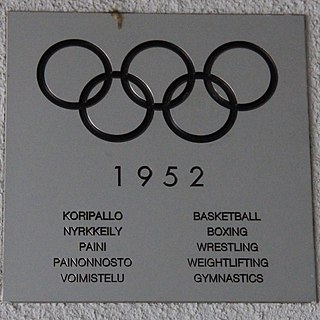
The men's pommel horse competition at the 1952 Summer Olympics was held at Töölö Sports Hall, Exhibition Hall I from 19 to 21 July. It was the eighth appearance of the event. There were 185 competitors from 29 nations, with each nation sending up to 8 gymnasts. The event was won by Viktor Chukarin as the Soviet Union swept the medals in its debut. It was the fourth medal sweep in the event, and last before apparatus finals with a two-gymnast-per-nation limit made further sweeps impossible. Yevgeny Korolkov and Hrant Shahinyan tied for silver.

The men's parallel bars competition at the 1952 Summer Olympics was held at Messuhalli, Exhibition Hall I from 19 to 21 July. It was the eighth appearance of the event. There were 185 competitors from 29 nations, with each nation sending up to 8 gymnasts. The event was won by Hans Eugster of Switzerland, the nation's second consecutive and third overall victory in the parallel bars, breaking a tie with Germany for most all-time. Switzerland also took bronze, as Josef Stalder repeated his 1948 third-place performance. The Soviet Union's debut resulted in a silver medal for Viktor Chukarin, who would become the third multi-medalist in 1956.
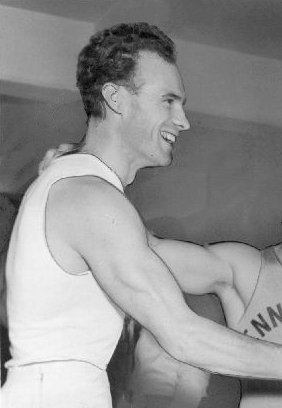
The men's horizontal bar competition at the 1952 Summer Olympics was held at Töölö Sports Hall, Exhibition Hall I from 19 to 21 July. It was the eighth appearance of the event. There were 185 competitors from 29 nations, with each nation sending up to 8 gymnasts. The event was won by Jack Günthard of Switzerland, the nation's second consecutive and third overall victory in the horizontal bar, breaking a tie with the United States for most all-time. Switzerland also took one of the silver medals, as Josef Stalder tied with Alfred Schwarzmann of Germany, competing at the age of 40, for second. Stalder and Schwarzmann were the first two men to win multiple horizontal bars medals; Stalder had won the event in 1948 and Schwarzmann had earned bronze in 1936.













